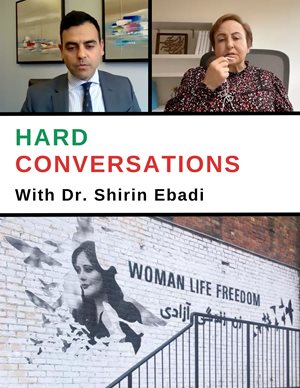“It’s fortunate that men and women are fighting together in this revolution, because they know that democracy passes through women’s rights, and they know that the victory of democracy in Iran is the introduction of women's rights in Iran.” - Dr. Shirin Ebadi
Introduction
In March 2023, the Ontario Bar Association's Policy and Public Affairs Committee launched its Hard Conversations Series, a complimentary speaker series and forum for educated conversations on complex issues. Hard Conversations Part I featured Nobel Peace Prize winner and former Iranian Judge turned human rights activist Dr. Shirin Ebadi, who graciously agreed to be interviewed by our Committee Chair, Mohsen Seddigh. Dr. Ebadi provided us with valuable insights into the Islamic Republic of Iran and the “Woman, Life, Freedom” revolution that emerged as a response to institutional discrimination faced by Iranian women in their day-to-day lives.
An Oppressive Regime
The Islamic Republic of Iran was established in 1979 following the Iranian Revolution, which resulted in the ouster of King Mohammadreza Reza Pahlavi—the last Shah of Iran—and the return of Ayatollah Ruhollah Khomeini from exile with promises of democracy. Khomeini became the Supreme Leader of Iran in December 1979, and the fundamentalist regime that he established has been in power ever since. His anti-Western Islamist theocracy has been characterized by a relentless assault on women, curtailment of political and religious freedoms, pervasive censorship and restrictions on speech, and countless senseless killings and other human rights violations.
Antiquated forms of punishment such as stoning, flogging and mutilation are still practiced in Iran and are in fact quite common. While some may argue that such punishments are necessary for preserving social order, the reality is that they are still used in modern-day Iran for the sole purpose of instilling fear, suppressing dissent, and discouraging opposition to the regime.
Women in Iran have also faced various forms of punishment for not adhering to the compulsory hijab laws, including arrest, imprisonment, fines, and even physical abuse. According to Dr. Ebadi, things were not always this way. Prior to 1979, women could choose not to wear the hijab and there was freedom of religion. By contrast, nowadays, atheists can be executed and Muslims who convert or change their religion can be punished and even put to death. Besides Islam, only Christianity, Judaism and Zoroastrianism have been afforded some degree of recognition under the constitution. Other religions are not recognized at all, and adherents of these marginalized faiths have been persecuted and denied their citizenship rights. This includes the Baha’is, the Yarsanis and the Yazidis.
These oppressive circumstances have served as a catalyst for a women-led movement known as the “Woman, Life, Freedom” revolution.










